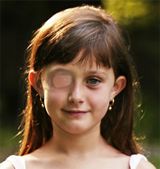Amblyopia
 |
“Lazy eye” affects about four
million people in the United States. It occurs
when, for one of several reasons, one eye is
used less than the other. If one eye is crossed
or turns out, the individual sees double, so he
or she learns to “shut off” or ignore that eye.
If the two eyes are very different, one
nearsighted and the other farsighted, the same
thing can occur. After a while, vision in the
unused eye is reduced.
For many years it was thought that amblyopia, or
“lazy eye” – when one eye sees poorly and cannot
be helped with corrective lenses – was a
permanent condition unless it was detected and
treated before the age of six. Many optometrists
no longer accept this, believing that even
adults can improve their sight - if not
completely correct their lazy eye – through
special therapy. |
The American
Optometric Association agrees that current research
proves the old theory wrong. The success rate does drop
off as one gets older, but the cut-off at age six is
arbitrary. Age should not be a barrier, though the
longer the condition has existed the more difficult it
becomes to treat.
Treatment varies depending on the extent of the
condition, the patients’ age and the optometrist. Small
children often have their stronger eye patched for
several hours a day. This stimulates the use of the weak
eye while they perform exercises such as coloring,
cutting things out and tracing.
Vision therapy – usually several hours a week, in the
doctor’s office and at home – will often correct the
underlying reason for the lazy eye. Very small children
can improve in a month or two; older children may take
several months to a year to respond.
With adults, treatment is basically the same, but it
takes longer. Adults may not wear a patch at all if
vision is very poor, or only for an hour or two at home
while doing fine tasks such as coloring in the 0’s of a
newspaper. Patients do exercises designed to improve
focusing, tracking and spatial judgment.
Many times after treatment, 50 percent of the older
children and adults see as well or almost as well with
their lazy eye as with their normal eye, and four out of
five of the rest at least show improvement. Results are
permanent when both the amblyopia and the underlying
problem are corrected. When the latter can’t be treated,
patients should continue the exercises on a
less-frequent basis and visit their optometrist
periodically so that the eye does not weaken again.
|